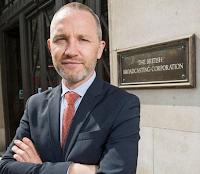Other BBC-related news this week concerns
James Purnell's call for the BBC to be given top billing over rivals like Sky, Netflix and Amazon in TV guides, and for this to be enforced by law. This is something that
News-watch's David Keighley
describes elsewhere [see below] as "patronising,
droit de seigneur" behaviour and an attempt to "steamroller Parliament".
Also, as well as that letter from over 70 MPs calling for the BBC to get a grip over its Brexit coverage, former culture secretary
John Whittingdale has warned that MPs might "escalate" their concerns about the BBC to Ofcom if the corporation fails to stop its negative bias over Brexit - though, to quote David again, Ofcom might not be the tiger Mr Whittingdale hopes it will be:
The focus of Ofcom boss Sharon White seems, however, to be elsewhere. At an Oxford media conference earlier this month her main concern was ‘diversity’ and the lack of older women on BBC screens. Another major problem is that the Ofcom Content Board, which will be the final court of appeal in complaints about BBC output, is chock-full of ex-BBC figures.
Both of those stories came from the Daily Telegraph.
Over at
The Conservative Woman David Keighley himself
reports the outcome of his complaint to the BBC about their coverage of the death of Arkadiusz Jozwik shortly after the Brexit vote - a death the BBC's initial reporting linked closely to claims that the Leave vote on June 23rd had resulted in a rise in hate crimes, presenting viewers with the idea of a frenzied hate-filled gang of youths targeting a Polish man. The police, however, later dismissed the 'hate crime' claim and one boy has now been convicted of manslaughter. David pursued the BBC doggedly through all the stages of the BBC's complaints process (Complaints Unit, Editorial Standards), eventually reaching the stage so many have reached before - receiving notification that his complaint is "not upheld" and won't be taken any further. "Surprise, surprise!", as David says.
The
Daily Mail, meanwhile,
has a story of BBC 'fakery'. According to the paper, the producers of Reggie Yates's series
Hidden Australia wanted to show Aborigines drinking to back up their 'ravaged by alcohol addiction't theme and then "panicked when they realised they didn't have enough footage of drinking", So they roped in some footage of a wake as a 'party scene'. The BBC has apologised for misleading viewers and removed the programme from the iPlayer. The BBC's apology does, however, make it sound as if the independent production company behind it was to blame. It has "banned" them as a result, according to the
Mail.
The
Mail has a piece today about how unfunny viewers found last night's Comic Relief. I didn't watch it myself so I wouldn't know. We did the usual Comic Relief collection at work but, oddly, no one (and certainly not me) took up the suggestion that we all come to work in our pyjamas. I have seen one clip of it though that made me laugh - though it wasn't an intentional joke.
Click here and view the top video. (It involves Russell Brand, though there's no swearing).
Oddly the sharpest criticism of Comic Relief comes from
an article in The Guardian by David Lammy MP. He criticises Comic Relief for perpetuating patronising stereotypes about Africans:
He points out that many African countries have been doing well recently - and not just as a result of Western charity - with life expectancy and GDP rising significantly in the majority of them. As I didn't watch this year's Comic Relief I can't say whether his characterisation remains true, though it certainly fits with my memories of watching it in years gone by.
Now, all the 'right-wing papers', of course, covered the MPs' open letter about BBC bias, not very favourably for the BBC. The 'left-wing' papers, equally 'of course perhaps', rallied to the BBC. Brian Reade in the
Daily Mirror accuses the MPs of trying to "gag" the BBC and calls its "a dumb move" and the
Guardian's media editor Jame Martinson
accuses the MPs of "blaming the messenger". Though the far-left isn't keen on the BBC, the centre-left still seems fully on board.
And at the right-wing equivalent of the
New Statesman, the
Spectator, there's
that Rod Liddle piece which
Sue wrote about yesterday. As Sue said, it seems to echo much of what we've been saying to a striking degree. (And I agree with pretty much everything he writes there, even down to his praise for Carrie Gracie).
Plus he tells (or re-tells) anecdotes from his days as a BBC editor (on Today): of the then BBC’s controller of editorial policy who told him that people like us who complain about pro-EU BBC bias are "mad"; of the BBC Brussels office knocking down stories of EU "bureaucratic profligacy and incompetence" because they were so pro-EU; of the BBC chief correspondent who wrote a book about European populists called "Preachers of Hate"; and of his being told that only one person at Newsnight had voted Leave (which is one more than expected!).
That's enough 'further reading' for today.



















